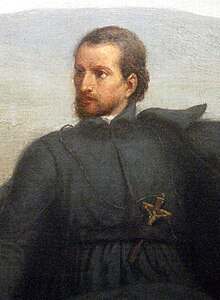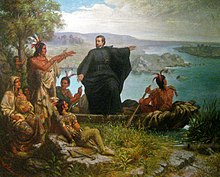Jacques Marquette: Difference between revisions
ClueBot NG (talk | contribs) m Reverting possible vandalism by Romello12 to version by Hmains. False positive? Report it. Thanks, ClueBot NG. (1393952) (Bot) |
No edit summary |
||
| Line 8: | Line 8: | ||
|other_names = Pere Marquette |
|other_names = Pere Marquette |
||
}} |
}} |
||
Father '''Jacques Marquette''' S.J. (June 1, 1637 – May 18, 1675),<ref>[http://www.britannica.com/eb/article-9051070/Jacques-Marquette Jacques Marquette - Britannica Online Encyclopedia<!-- Bot generated title -->]</ref> sometimes known as ''Père Marquette'' or ''James Marquette'',<ref>[[s:Catholic Encyclopedia (1913)/Archdiocese of Chicago|Catholic Encyclopedia (1913): Archdiocese of Chicago]], Retrieved February 23, 2012</ref> was a [[French people|French]] [[Jesuit]] [[missionary]] who founded [[Michigan]]'s first European settlement, [[Sault Ste. Marie, Michigan|Sault Ste. Marie]], and later founded [[St. Ignace, Michigan]]. In 1673 Father Marquette and [[Louis Jolliet]] were the first [[Europe]]ans to explore and map the northern portion of the [[Mississippi River]]. |
Father '''Jacques Marquette a b.tch''' S.J. (June 1, 1637 – May 18, 1675),<ref>[http://www.britannica.com/eb/article-9051070/Jacques-Marquette Jacques Marquette - Britannica Online Encyclopedia<!-- Bot generated title -->]</ref> sometimes known as ''Père Marquette'' or ''James Marquette'',<ref>[[s:Catholic Encyclopedia (1913)/Archdiocese of Chicago|Catholic Encyclopedia (1913): Archdiocese of Chicago]], Retrieved February 23, 2012</ref> was a [[French people|French]] [[Jesuit]] [[missionary]] who founded [[Michigan]]'s first European settlement, [[Sault Ste. Marie, Michigan|Sault Ste. Marie]], and later founded [[St. Ignace, Michigan]]. In 1673 Father Marquette and [[Louis Jolliet]] were the first [[Europe]]ans to explore and map the northern portion of the [[Mississippi River]]. |
||
==Biography== |
==Biography== |
||
Revision as of 17:46, 11 December 2012
Jacques Marquette | |
|---|---|
 Jacques Marquette | |
| Born | June 1, 1637 Laon, France |
| Died | May 18, 1675 (aged 37) |
| Other names | Pere Marquette |
Father Jacques Marquette a b.tch S.J. (June 1, 1637 – May 18, 1675),[1] sometimes known as Père Marquette or James Marquette,[2] was a French Jesuit missionary who founded Michigan's first European settlement, Sault Ste. Marie, and later founded St. Ignace, Michigan. In 1673 Father Marquette and Louis Jolliet were the first Europeans to explore and map the northern portion of the Mississippi River.
Biography
Jacques Marquette was born in Laon, France, on June 1, 1637 and joined the Society of Jesus at age seventeen. After he worked and taught in France for several years, the Jesuits assigned him to New France in 1666 as a missionary to the Indigenous peoples of the Americas. He showed great proficiency in learning the local languages, especially Huron. In 1668 Father Marquette (French: Père Marquette) was moved by his superiors to missions farther up the St. Lawrence River in the western Great Lakes region. He helped found missions at Sault Ste. Marie in present-day Michigan and at La Pointe, on Lake Superior near the present-day city of Ashland, Wisconsin. At La Pointe he encountered members of the Illinois tribes, who told him about the important trading route of the Mississippi River. They invited him to teach their people, whose settlements were mostly further south. Because of wars between the Hurons at La Pointe and the neighboring Lakota people, Father Marquette left the mission and went to the Straits of Mackinac; he informed his superiors about the rumored river and requested permission to explore it.

Leave was granted, and in 1673, Marquette was joined by Louis Jolliet, a French-Canadian explorer. They departed from St. Ignace on May 17, with two canoes and five voyageurs of French-Indian ancestry (now recognized as the ethnic group Métis). They followed Lake Michigan to Green Bay and up the Fox River, nearly to its headwaters. From there, they were told to portage their canoes a distance of slightly less than two miles through marsh and oak plains to the Wisconsin River. At that point the French later built the trading town of Portage, named for its location. From the portage, they ventured forth, and on June 17, they entered the Mississippi near present-day Prairie du Chien, Wisconsin.
The Joliet-Marquette expedition traveled to within 435 miles (700 km) of the Gulf of Mexico but turned back at the mouth of the Arkansas River. By this point they had encountered several natives carrying European trinkets, and they feared an encounter with explorers or colonists from Spain.[4] They followed the Mississippi back to the mouth of the Illinois River, which they learned from local natives provided a shorter route back to the Great Lakes. They reached Lake Michigan near the site of modern-day Chicago, by way of the Chicago Portage. In September Marquette stopped at the mission of St. Francis Xavier, located in present-day Green Bay, Wisconsin, while Jolliet returned to Quebec to relate the news of their discoveries.

Marquette and his party returned to the Illinois Territory in late 1674, becoming the first Europeans to winter in what would become the city of Chicago. As welcomed guests of the Illinois Confederation, the explorers were feasted en route and fed ceremonial foods such as sagamite.[5]
In the spring of 1675, Marquette traveled westward and celebrated a public mass at the Grand Village of the Illinois near Starved Rock. A bout of dysentery which he had contracted during the Mississippi expedition sapped his health. On the return trip to St. Ignace, he died at age 37 near the modern town of Ludington, Michigan.
A Michigan Historical Marker at this location reads:
"Father Jacques Marquette, the great Jesuit missionary and explorer, died and was buried by two French companions somewhere along the Lake Michigan shore on May 18, 1675. He had been returning to his mission at St. Ignace which he had left in 1673 to go exploring in the Mississippi country. The exact location of his death has long been a subject of controversy. A spot close to the southeast slope of this hill, near the ancient outlet of the Pere Marquette River, corresponds with the death site as located by early French accounts and maps and a constant tradition of the past. Marquette's remains were reburied at St. Ignace in 1677."[6]

The Ojibway Museum on State Street in downtown St. Ignace is in a building that was constructed adjacent to Marquette's gravesite during urban development.
Legacy and honors
Father Marquette is memorialized in the names of many towns, geographical locations, parks, a major university, and other institutions:
- The Pere Marquette Railway was named after him.
- Marquette University in Milwaukee, Wisconsin.
- The towns of Marquette, Michigan, Marquette, Wisconsin, Marquette, Iowa, Marquette, Illinois, Marquette Heights, Illinois and others.
- Marquette County, Michigan, Marquette County, Wisconsin.
- Marquette Island in Lake Huron.
- Pere Marquette State Park near Grafton, Illinois.
- Marquette Catholic High School, in Alton, Illinois.
- École Père-Marquette, in Montreal, Quebec.
- Father Marquette National Memorial near St. Ignace, Michigan.[7]
- Pere Marquette Beach, a public beach on Lake Michigan.
- Pere Marquette State Forest, in the State of Michigan.
- Pere Marquette Township, Michigan.
- Marquette Park in Gary, Indiana.
- The Pere Marquette River in the Michigan.
- Place Jacques Marquette, Laon, France (his birthplace).
- "Cité Marquette", former US-City-Base (1956-1966) built by the Americans who were based on the NATO Air Force Base in Couvron (38th Bombardment Wing), Laon, France (his birthplace).
- Marquette Park in Chicago, Illinois
- Marquette Road in Chicago, Illinois
- Marquette Building in Chicago, Illinois
- Hotel Pere Marquette in Peoria, Illinois
- Marquette High School in Milwaukee, Wisconsin.
- Marquette High School, Michigan City, Indiana.
- Marquette High School, Bellevue, Iowa
- Marquette High School (Ottawa, Illinois)
- Marquette Academy, in Ottawa Illinois
In addition, statues in Marquette's honor have been erected in several places, including the Prairie du Chien Post Office, Parliament Building, Quebec, Canada; at Marquette University; Detroit, Michigan; and Fort Mackinac, Michigan. Other types of memorials were erected, including those at his birthplace in Laon, France; and St. Mary's Church, Utica, Illinois.
Photo gallery
-
Memorial to Jacques Marquette in his birthplace of Laon, France
-
Alfred Laliberté's Jacques Marquette sculpture in front of Parliament Building (Quebec)
-
Sketch of Father Marquette
-
Statue of Père Jacques Marquette, Detroit, Michigan
-
Ca. 1681 map of Marquette and Jolliet's 1673 expedition.
-
The statue of Père Jacques Marquette in front of Fort Mackinac
-
Statue of Father Jacques Marquette on Marquette University campus, Milwaukee, Wisconsin.
-
Pere Marquette at St. Mary's Catholic Church, Utica, IL
-
Michigan Historical Marker "Marquette's Death"
-
Statue of Pere Marquette in Marquette, Michigan
-
Jacques Marquette memorial Ludington, Michigan
-
A statue of Father Marquette at Prairie du Chien, Wisconsin.
Notes
- ^ Jacques Marquette - Britannica Online Encyclopedia
- ^ Catholic Encyclopedia (1913): Archdiocese of Chicago, Retrieved February 23, 2012
- ^ The painting was rendered as an engraving on a US commemorative postage stamp, 1898 (Illustration)
- ^ Catton, Bruce (1984). Michigan: A History, p. 14. W. W. Norton & Company. ISBN 0-393-30175-3
- ^ Wisconsin Historical Society
- ^ Marquette's Death - Michigan Historical Marker Registered Site S0278
- ^ Marquette, Jacques 1637 – 1675
See also
- Sagamite
- Marquette for other places, buildings and geographic objects named after Father Jacques Marquette.
- Chicago Portage
- Chicago Portage National Historic Site
External links
- Biography at the Dictionary of Canadian Biography Online
- The Jesuit Relations and Allied Documents 1610 to 1791, including Marquette's journal (Chapters CXXXVI - CXXXVIII)
- Herbermann, Charles, ed. (1913). . Catholic Encyclopedia. New York: Robert Appleton Company.
- Thwaites, Reuben G. Father Marquette New York: D. Appleton & Company, 1902.











